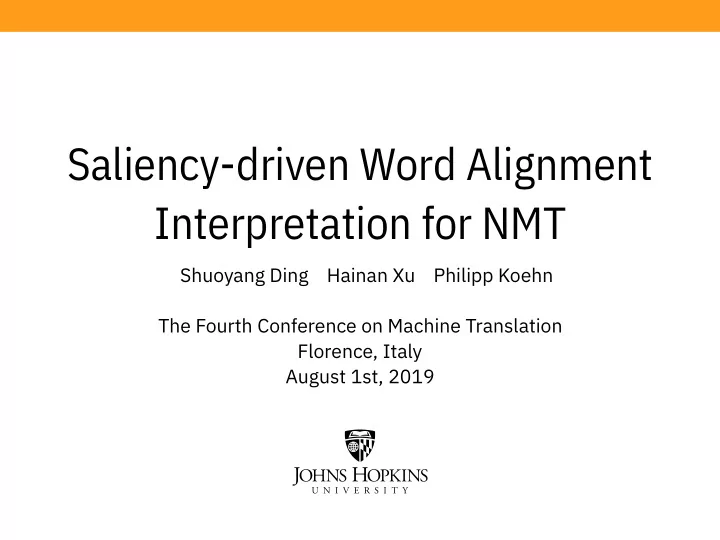

Saliency-driven Word Alignment Interpretation for NMT Shuoyang Ding Hainan Xu Philipp Koehn The Fourth Conference on Machine Translation Florence, Italy August 1st, 2019
Revisiting Six Challenges • poor out-of-domain performance • poor low-resource performance • low frequency words • long sentences • attention is not word alignment • large beam does not help [Koehn and Knowles 2017] Saliency-driven Word Alignment Interpretation for NMT 2
Revisiting Six Challenges • poor out-of-domain performance • poor low-resource performance • low frequency words • long sentences • attention is not word alignment • large beam does not help [Koehn and Knowles 2017] Saliency-driven Word Alignment Interpretation for NMT 3
A Model Interpretation Problem Saliency-driven Word Alignment Interpretation for NMT 4
A Model Interpretation Problem Saliency-driven Word Alignment Interpretation for NMT 5
Related Findings Outside MT • “ Attention is not Explanation ” [Jain and Wallace NAACL 2019] • “ Is Attention Interpretable? ” (Spoiler: No) [Serrano and Smith ACL 2019] • We also have empirical results that corroborate these findings. • … and we have method that works better! Saliency-driven Word Alignment Interpretation for NMT 6
Saliency: Identifying Important Features
Recap Saliency-driven Word Alignment Interpretation for NMT 8
Recap Saliency-driven Word Alignment Interpretation for NMT 9
Focus on solten Saliency-driven Word Alignment Interpretation for NMT 10
Perturbation Saliency-driven Word Alignment Interpretation for NMT 11
Perturbation Saliency-driven Word Alignment Interpretation for NMT 12
Assumption The output score is more sensitive to perturbations in important features . Saliency-driven Word Alignment Interpretation for NMT 13
E.g. Saliency-driven Word Alignment Interpretation for NMT 14
E.g. Saliency-driven Word Alignment Interpretation for NMT 15
E.g. Saliency-driven Word Alignment Interpretation for NMT 16
Saliency Saliency-driven Word Alignment Interpretation for NMT 17
Saliency when : Saliency-driven Word Alignment Interpretation for NMT 18
Saliency Saliency-driven Word Alignment Interpretation for NMT 19
What’s good about this? 1. Derivatives are easy to obtain for any DL toolkit 2. Model-agnostic 3. Adapts with the choice of output words Saliency-driven Word Alignment Interpretation for NMT 20
Prior Work on Saliency • Widely used and studied in Computer Vision! [Simonyan et al. 2013][Springenberg et al. 2014] [Smilkov et al. 2017] • Also in a few NLP work for qualitative analysis [Aubakirova and Bansal 2016][Li et al. 2016][Ding et al. 2017] [Arras et al. 2016;2017][Mudrakarta et al. 2018] Saliency-driven Word Alignment Interpretation for NMT 21
SmoothGrad • Gradients are very local measure of sensitivity. • Highly non-linear models may have pathological points where the gradients are noisy . • Solution: calculate saliency for multiple copies of the same input corrupted with gaussian noise , and average the saliency of copies. [Smilkov et al. 2017] Saliency-driven Word Alignment Interpretation for NMT 22
Establishing Saliency for Words
“Feature” in Computer Vision Photo Credit: Hainan Xu Saliency-driven Word Alignment Interpretation for NMT 24
“Feature” in NLP It’s straight-forward to compute saliency for a single dimension of the word embedding. Saliency-driven Word Alignment Interpretation for NMT 25
“Feature” in NLP But how to compose the saliency of each dimension into the saliency of a word ? Saliency-driven Word Alignment Interpretation for NMT 26
Our Proposal Consider word embedding look-up as a dot product between the embedding matrix and an one-hot vector . Saliency-driven Word Alignment Interpretation for NMT 27
Our Proposal The 1 in the one-hot vector denotes the identity of the input word . Saliency-driven Word Alignment Interpretation for NMT 28
Our Proposal Let’s perturb that 1 like a real value ! i.e. take gradients with regard to the 1 . Saliency-driven Word Alignment Interpretation for NMT 29
Our Proposal e i ⋅ ∂ y ∑ ∂ e i i range: ( −∞ , ∞ ) Saliency-driven Word Alignment Interpretation for NMT 30
Experiment
Evaluation • Evaluation of interpretations is tricky ! • Fortunately, there’s human judgments to rely on. • Need to do force decoding with NMT model. Saliency-driven Word Alignment Interpretation for NMT 32
Setup • Architecture: Convolutional S2S, LSTM, Transformer (with fairseq default hyper- parameters) • Dataset: Following Zenkel et al. [2019], which covers de-en , fr-en and ro-en . • SmoothGrad hyper-parameters: N=30 and σ =0.15 Saliency-driven Word Alignment Interpretation for NMT 33
Baselines • Attention weights • Smoothed Attention : forward pass on multiple corrupted input samples, then average the attention weights over samples • [Li et al. 2016] : compute element-wise absolute value of embedding gradients, then average over embedding dimensions • [Li et al. 2016] + SmoothGrad Saliency-driven Word Alignment Interpretation for NMT 34
Convolutional S2S on de-en AER Saliency-driven Word Alignment Interpretation for NMT 15 20 25 30 35 40 45 Attention Smoothed Attention Li+Grad Li+SmoothGrad Ours+Grad Ours+SmoothGrad fast-align Zenkel et al. [2019] GIZA++ 35
Attention on de-en 65 55 45 AER 35 25 15 Conv LSTM Transformer fast-align Zenkel et al. [2019] GIZA++ Saliency-driven Word Alignment Interpretation for NMT 36
Ours+SmoothGrad on de-en 65 55 45 AER 35 25 15 Conv LSTM Transformer fast-align Zenkel et al. [2019] GIZA++ Saliency-driven Word Alignment Interpretation for NMT 37
Li vs. Ours Saliency-driven Word Alignment Interpretation for NMT 38
Li vs. Ours Saliency-driven Word Alignment Interpretation for NMT 39
Conclusion
Conclusion • Saliency + proper word-level score formulation is a better interpretation method than attention • NMT models do learn interpretable alignments . We just need to properly uncover them ! Paper Code Slides https://github.com/shuoyangd/meerkat Saliency-driven Word Alignment Interpretation for NMT 41
Recommend
More recommend